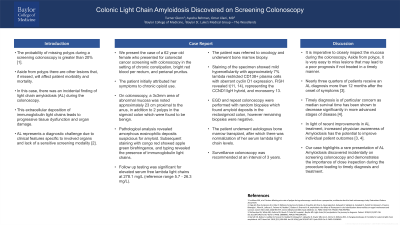Monday Poster Session
Category: Colon
P2071 - Colonic Light Chain Amyloidosis Discovered on Screening Colonoscopy
Monday, October 28, 2024
10:30 AM - 4:00 PM ET
Location: Exhibit Hall E

Has Audio
- TG
Turner Glenn
Baylor College of Medicine
Houston, TX
Presenting Author(s)
Turner Glenn, 1, Omar Jilani, MD2
1Baylor College of Medicine, Houston, TX; 2Baylor College of Medicine, The Woodlands, TX
Introduction: The probability of missing polyps during a screening colonoscopy is greater than 20%. Aside from polyps there are other lesions that, if missed, will affect patient morbidity and mortality. In this case, there was an incidental finding of light chain amyloidosis (AL) during the colonoscopy. This extracellular deposition of immunoglobulin light chains leads to progressive tissue dysfunction and organ damage. AL represents a diagnostic challenge due to clinical features specific to involved organs and lack of a sensitive screening modality.
Case Description/Methods: A 62-year-old female presented for colorectal cancer screening in the setting of chronic constipation, bright red blood per rectum, and perianal pruritus. The patient initially attributed her symptoms to chronic opioid use. On colonoscopy, a 3x3mm area of abnormal mucosa was noted approximately 23 cm proximal to the anus. Pathology revealed amorphous eosinophilic deposits suspicious for amyloid. Subsequent staining with congo red stain showed apple green birefringence, and typing revealed the presence of immunoglobulin light chains. Follow up testing was significant for elevated serum free lambda light chains at 278.1 mg/L (reference range 5.7 - 26.3 mg/L).
The patient was referred to oncology and underwent bone marrow biopsy. Staining of the specimen showed mild hypercellularity with approximately 7% lambda restricted CD138+ plasma cells with aberrant cyclin D1 expression. FISH revealed t(11, 14), representing the CCND1/IgH hybrid, and monosomy 13. EGD and repeat colonoscopy were performed with random biopsies which found amyloid deposits in the rectosigmoid colon, however remaining biopsies were negative. The patient underwent autologous bone marrow transplant, after which there was normalization of her serum lambda light chain levels.
Discussion: It is imperative to closely inspect the mucosa during the colonoscopy. Aside from polyps, it is very easy to miss lesions that may lead to a poor prognosis if not treated in a timely manner. Nearly three quarter of patients receive an AL diagnosis more than 12 months after the onset of symptoms. Timely diagnosis is of particular concern as median survival time has been shown to decrease significantly in more advanced stages of disease. Our case highlights a rare presentation of AL discovered on screening colonoscopy, and demonstrates the importance of close inspection during the procedure leading to timely diagnosis and treatment.
Disclosures:
Turner Glenn, 1, Omar Jilani, MD2. P2071 - Colonic Light Chain Amyloidosis Discovered on Screening Colonoscopy, ACG 2024 Annual Scientific Meeting Abstracts. Philadelphia, PA: American College of Gastroenterology.
1Baylor College of Medicine, Houston, TX; 2Baylor College of Medicine, The Woodlands, TX
Introduction: The probability of missing polyps during a screening colonoscopy is greater than 20%. Aside from polyps there are other lesions that, if missed, will affect patient morbidity and mortality. In this case, there was an incidental finding of light chain amyloidosis (AL) during the colonoscopy. This extracellular deposition of immunoglobulin light chains leads to progressive tissue dysfunction and organ damage. AL represents a diagnostic challenge due to clinical features specific to involved organs and lack of a sensitive screening modality.
Case Description/Methods: A 62-year-old female presented for colorectal cancer screening in the setting of chronic constipation, bright red blood per rectum, and perianal pruritus. The patient initially attributed her symptoms to chronic opioid use. On colonoscopy, a 3x3mm area of abnormal mucosa was noted approximately 23 cm proximal to the anus. Pathology revealed amorphous eosinophilic deposits suspicious for amyloid. Subsequent staining with congo red stain showed apple green birefringence, and typing revealed the presence of immunoglobulin light chains. Follow up testing was significant for elevated serum free lambda light chains at 278.1 mg/L (reference range 5.7 - 26.3 mg/L).
The patient was referred to oncology and underwent bone marrow biopsy. Staining of the specimen showed mild hypercellularity with approximately 7% lambda restricted CD138+ plasma cells with aberrant cyclin D1 expression. FISH revealed t(11, 14), representing the CCND1/IgH hybrid, and monosomy 13. EGD and repeat colonoscopy were performed with random biopsies which found amyloid deposits in the rectosigmoid colon, however remaining biopsies were negative. The patient underwent autologous bone marrow transplant, after which there was normalization of her serum lambda light chain levels.
Discussion: It is imperative to closely inspect the mucosa during the colonoscopy. Aside from polyps, it is very easy to miss lesions that may lead to a poor prognosis if not treated in a timely manner. Nearly three quarter of patients receive an AL diagnosis more than 12 months after the onset of symptoms. Timely diagnosis is of particular concern as median survival time has been shown to decrease significantly in more advanced stages of disease. Our case highlights a rare presentation of AL discovered on screening colonoscopy, and demonstrates the importance of close inspection during the procedure leading to timely diagnosis and treatment.
Disclosures:
Turner Glenn indicated no relevant financial relationships.
Omar Jilani indicated no relevant financial relationships.
Turner Glenn, 1, Omar Jilani, MD2. P2071 - Colonic Light Chain Amyloidosis Discovered on Screening Colonoscopy, ACG 2024 Annual Scientific Meeting Abstracts. Philadelphia, PA: American College of Gastroenterology.
